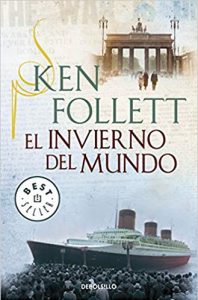It's been several years since I read «The fall of the giants«, The first part of the trilogy «The Century», Ken follet. So when I decided to read this second part: "The Winter of the World", I thought it would be difficult for me to relocate so many characters (you know that good old Ken is a specialist in creating overwhelming cosmos of characters and situations).
But this Welsh writer has a great virtue, beyond his literary gift. Follett is able to introduce you to each character in a sequel as if you had read the previous book just yesterday. Halfway between magic and literature, the author awakens some old springs from his previous stories that he somehow indelibly inserted into your memory.
Thus, in chapter 16, when suddenly a Russian character named Volodia Peshkov appears, he introduces him to you by pulling on that detail anchored in your memory and his entire existence becomes present to you. Suddenly you remember his father, his regrettable experiences throughout the first part, where his brother left for the United States, leaving his girlfriend pregnant so that he could take it all on his own.
It is only a detail, but it occurs throughout the entire book. Any nuance serves as an excuse for you to remember any character from the previous installment. You don't need to get lost in descriptions or more details. Ken Follet launches his probe into the well of your memory and brings to the present pages and more pages read yesterday or 5 years ago.
For the rest, the plot of the novel shows that unsurpassed art of turning each chapter into a novel in itself. Each new scene unfolds unforgettable vital moments of characters spanning the XNUMXs and XNUMXs. With the Spanish Civil War, the Second World War, with the subsequent political tensions between the allies ...
The characters of the story intermingle with reality in a fascinating way. Through them real aspects of history are known, perfectly interspersed with an intrahistory as real as it is sordid and cruel, which corresponds to those years in a Europe bathed in blood, hatred and fear.
I don't think there is an author who can create those plots that are sophisticated in their background and simplified in their form, so that the reader enjoys delving into the historical circumstances, in the very real experiences of the characters ..., The most surprising thing about this form of creation literary is that the thread is never broken, the credibility of characters and scenes always stands firm. The ties that bind each scene, each turn and each reaction are perfectly associated with the profiles of the characters.
To make you believe that a young man affiliated with the Nazi youth at the end of the 30s could join the communist ranks once the war is over. The magic of Follet is that everything is believable. What moves the characters to any attitude or change is wonderfully justified in a natural and consistent way. (Basically it is just a way of demonstrating the contradiction that can live in every human).
In my usual line of putting buts everywhere, I have to say that, faced with a fast-paced plot that you can't stop reading and that opens and closes entire chapters in themselves, the ending ends up fading into light, dim scenes, half-light . It is probably a necessary ending to anticipate a new installment, but some spark is missing, without a doubt.
I am going to start with "The Threshold of Eternity" shortly. On this occasion, with just days to spare, I will be able to remember all the details, although according to the location of this Welshman, I would not have needed it either.
You can now buy The World's Winter, one of Ken Follett's best novels, here:


სად შეიძლება შეძენა?